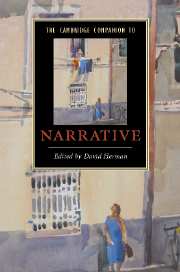2 - Toward a definition of narrative
from Part I - Preliminaries
Published online by Cambridge University Press: 28 September 2007
Summary
In the past fifteen years, as the “narrative turn in the humanities” gave way to the narrative turn everywhere (politics, science studies, law, medicine, and last, but not least, cognitive science), few words have enjoyed so much use and suffered so much abuse as narrative and its partial synonym, story. The French theorist Jean-François Lyotard invokes the “Grand Narratives” of a capitalized History; the psychologist Jerome Bruner speaks of narratives of identity; the philosopher Daniel Dennett describes mental activity on the neural level as the continuous emergence and decay of narrative drafts; the political strategist James Carville attributes the loss of John Kerry in the 2004 presidential election to the lack of a convincing narrative; and “narratives of race, class and gender” have become a mantra of cultural studies. Gerald Prince regards the contemporary use of the term narrative as a hedging device, a way to avoid strong positions: “One says 'narrative' instead of 'explanation' or 'argumentation' (because it is more tentative); one prefers 'narrative' to 'theory,' 'hypothesis,' or 'evidence' (because it is less scientistic); one speaks of a 'narrative' rather than 'ideology' (because it is less judgmental); one substitutes 'narrative' for 'message' (because it is more indeterminate).” Another narrative theorist, Peter Brooks, attributes the surging popularity of the word to a more positive cause: “While I think the term has been trivialized through overuse, I believe the overuse responds to a recognition that narrative is one of the principal ways we organize our experience of the world - a part of our cognitive tool kit that was long neglected by psychologists and philosophers.”
- Type
- Chapter
- Information
- The Cambridge Companion to Narrative , pp. 22 - 36Publisher: Cambridge University PressPrint publication year: 2007
- 158
- Cited by

